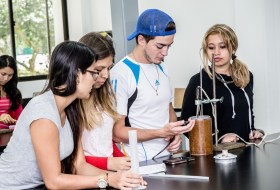News
AESS Unicauca obtains an international scholarship to develop an aerospace project in Cauca.
The Ticanor team from AESS Unicauca, composed of students and graduates from the University of Cauca, received the Distributed Sensing Technology and Education Initiative (DSTEI) scholarship from IEEE AESS to fund the design phase of a swarm drone system for coffee crop surveillance. The design and education process in aerospace systems engineering will take place across four countries over one year.
The Ticanor team from AESS Unicauca secured the Distributed Sensing Technology and Education Initiative (DSTEI) scholarship from IEEE AESS, enabling the team to design a swarm drone system for coffee crop surveillance. This initiative includes visits to Mexico, Ireland, Germany, and various national locations. The grant, facilitated by the Professional Association IEEE Colombia, amounts to $25,000 USD.
The Ticanor project, initially formulated in December 2022, was conceived as a means to assist the southwestern region of the country in agricultural matters. The team comprises Anderson Burgos, Katherine Gómez, and Enrique Manzano from the Electronic Engineering and Telecommunications program; Carlos Durán, Ángela Mutiz, Sara Abella, Jennyfer López from the Physics Engineering program; Michell García, and José Figueroa, graduates from the same program; Santiago García, a graduate from Systems Engineering; Luis Torres, a student of Electronic Engineering from the University of Antioquia; Sebastián Cajas, a graduate in Electronic Engineering and Telecommunications; Carlos Realpe, a student in the Master's program in Physics Engineering; Jesús Gurrute from Mathematics; Liseth Campo, project advisor and lecturer in the Department of Physics Engineering, and Camilo Segura, project director and student in Electronic Engineering and Telecommunications.
In this way, twelve projects were presented in South America, from which 2 were selected: Ticanor from the University of Cauca and the SDPFF project from the National University of San Antonio Abad in Cusco, Peru. Both groups presented on May 8 at the facilities of the Faculty of Engineering at Universidad Libre, Bogotá, with the presence of IEEE AESS President Mark Davis, IEEE Vice President of Member Services Lorenzo LoMonte, former IEEE AESS Colombia President Giovanna Ramírez, and IEEE AESS Peru President Robert Perea. Representatives from universities associated with IEEE AESS and experts in Colombian aerospace development also attended.
Ticanor proposes a drone system configured as a swarm to assist local farmers in the Cauca region in making planning and crop care decisions through precision agriculture surveillance products. The primarily educational project aims to train the team in aerospace systems engineering, precision agriculture, sensor fusion, wireless communications, and land observation through the design, known as Preliminary Design Review (PDR), of the mentioned system.
Additionally, it aims to strengthen relationships between institutions and opens doors for prototype development, professional work, research opportunities, and technological transition.
The team activities include sessions at the Center for Research and Advanced Studies (CINVESTAV), Mexico, Centre for Applied AI (CeADAR), Ireland, and support from teachers at the Telematics Engineering Group (GIT), University of Cauca, teacher Hever Moncayo, coordinator of the Aerospace Engineering Master's program, Embry-Riddle University (USA), and Félix Govaers, head of the Department for Sensor Data Fusion and Information Processing, University of Bonn (Germany).
The current funding is allocated to project phase 1, focused on the design. DSTEI will allocate resources for two more phases if the current objectives are met, aiming to achieve a system ready for testing in various communities to become a product.
The DSTEI program aims to empower young students from underrepresented regions in the Society of Electronic Systems of the Institute of Electrical and Electronic Engineers (IEEE) to promote projects that transform their talents into young aerospace professionals. The initiative is designed to strengthen the three phases of aerospace engineering systems development to transition young students into professionals with geoscience solutions that impact their community.
AESS Unicauca already presents three independently funded projects to strengthen the aerospace capabilities of the group for the University of Cauca and the region. It also appreciates the support of all its volunteers, mentors, allies (HappLab and SIA seedbed), and the general public. The team calls for more young people to support and drive the scientific and technological activism of more individuals in the country.


